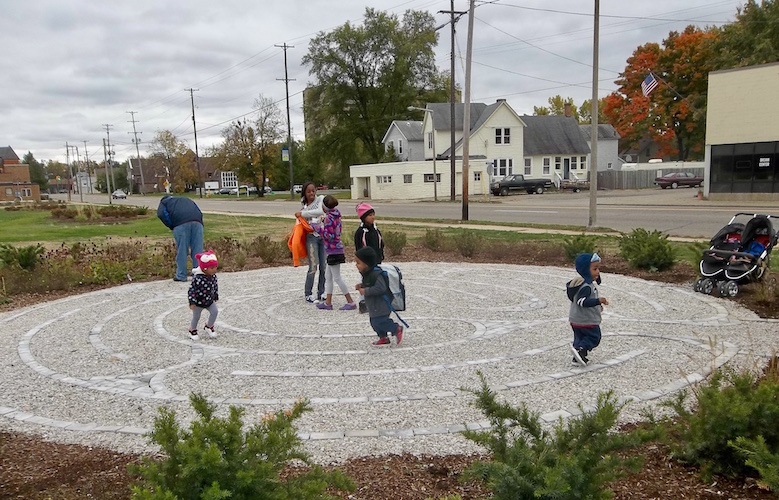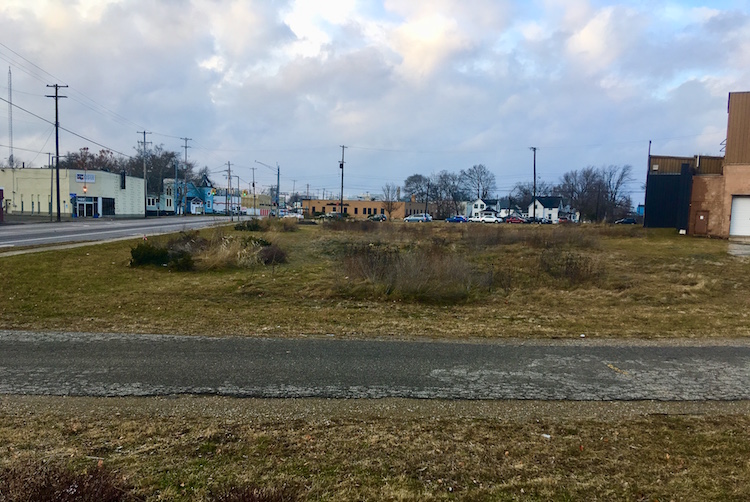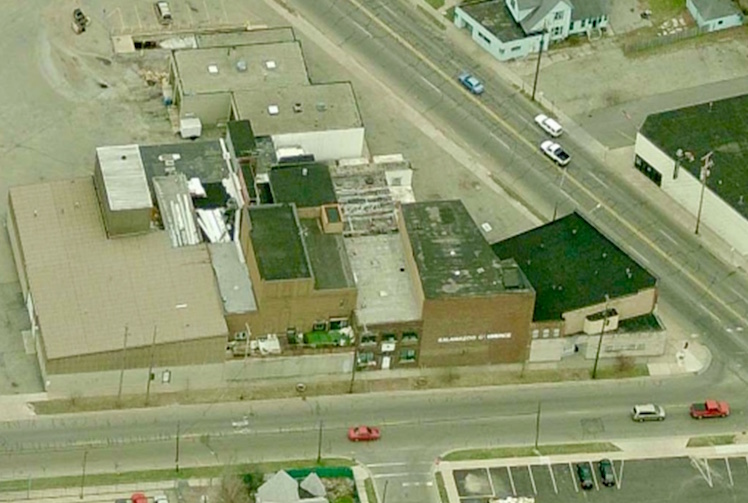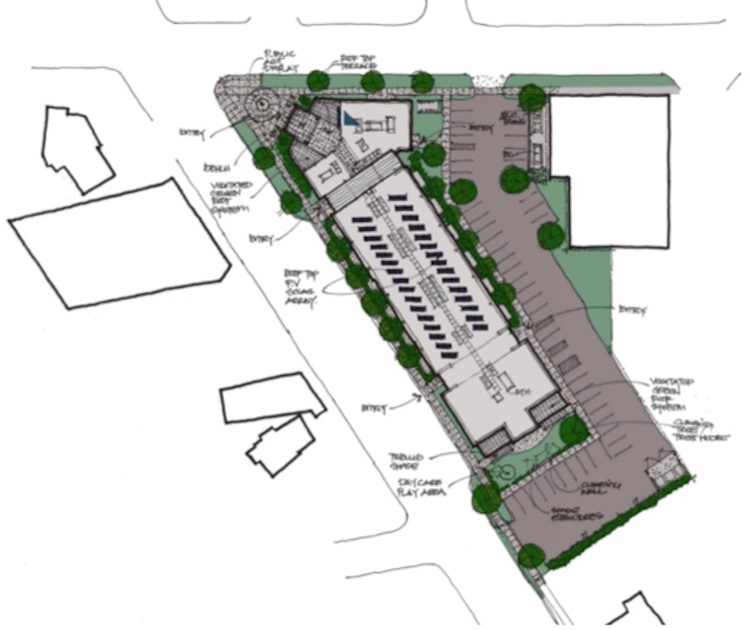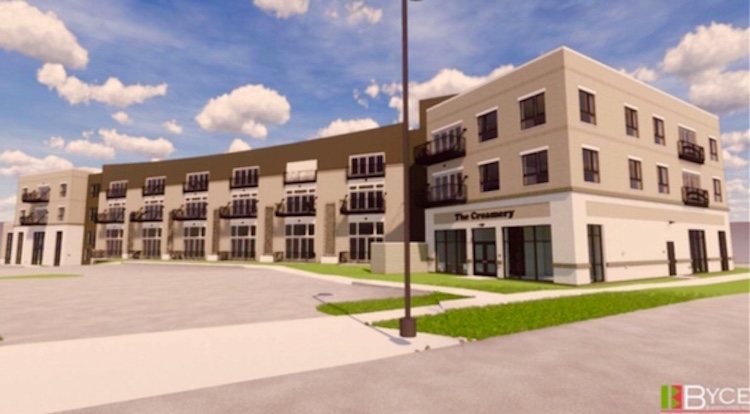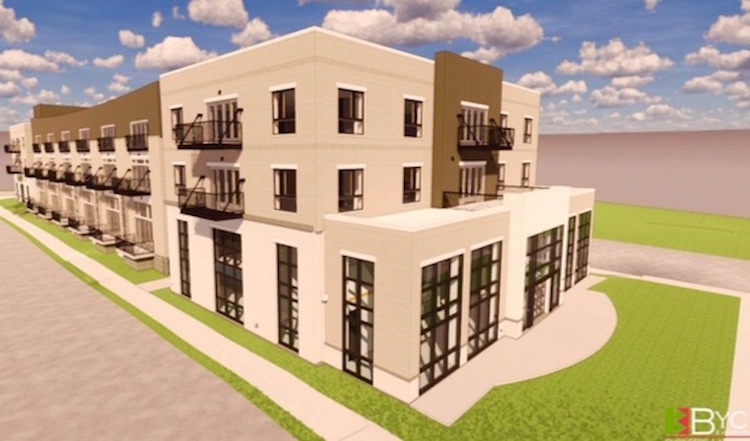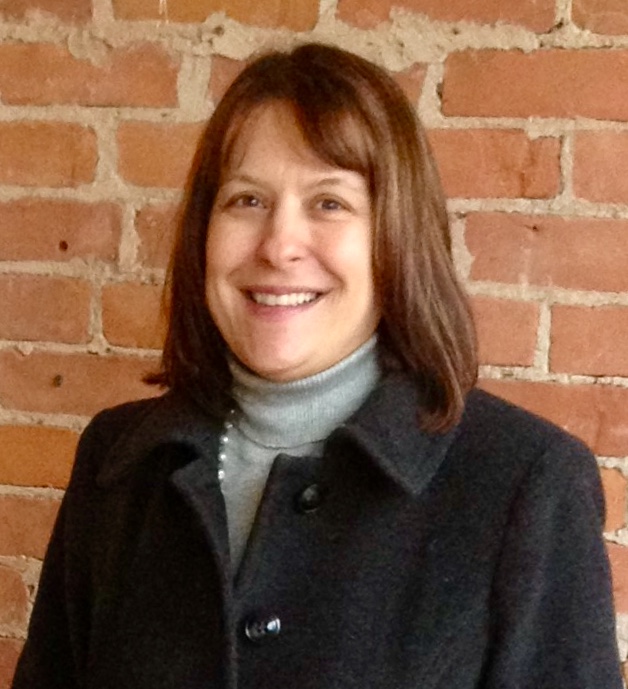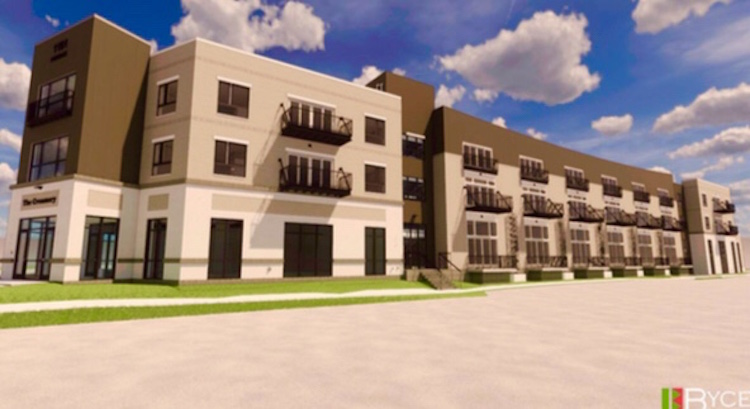Edison Neighborhood looks forward to The Creamery with its mix of residential and business spaces
Redevelopment of former industrial site expected to reinvigorate a section of Kalamazoo’s largest neighborhood, Edison.
Kids had to walk past the vacant and run down Klover Gold Creamery Co. buildings at Portage and Lake streets to get to the Washington Square Branch of the Kalamazoo Public Library.
Kelly Clarke pictured them coming from the Boys & Girls Club at 915 Lake St. She didn’t like the idea of boys and girls having to make their way past potentially dangerous buildings.
So she’s happy the Edison Neighborhood Association, the Local Initiatives Support Corporation and, her organization, the Kalamazoo County Land Bank, spearheaded their demolition in 2011.
And she’s even happier that a developer’s plan to build a 48-unit apartment and commercial structure is moving along on the 1.3-acre parcel at the southeast corner of Portage and Lake streets.
“It caught my eye because of the location,” says Clarke, who is executive director of the Kalamazoo County Land Bank, which is charged with reclaiming foreclosed and blighted properties in Kalamazoo County and putting them back into use.
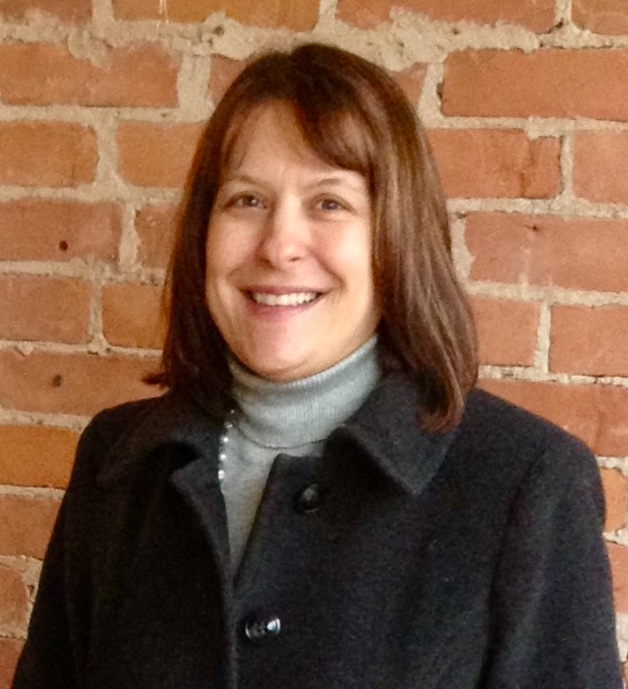
The Klover Gold Creamery closed in 1997 after doing business for about 78 years. The Land Bank is selling the unused site to Hollander Development Corp. for $65,000. An additional $125,000 payment will be collected at the time of the sale in lieu of 50 percent of the tax revenue the Land Band would typically receive for five years.
Clarke recalls a Kalamazoo Public Schools newsletter that showed children walking through the area and says, “It was one of those moments when you realize that it’s important to address these blighted structures.”
The planned development, which is being called The Creamery, is expected to help reinvigorate the Washington Square section of the Edison Neighborhood and help it reclaim some of the vibrancy it had in the early 1900s when it was a bustling business corridor leading out of downtown Kalamazoo.
Matt Hollander, president of Hollander Development, says his company is in the process of finalizing the necessary financing for the $14.2 million, three-story project.
“We’re hoping to have all of that in place in February – and construction will start this spring,” he says.
If all goes well, and weather is favorable, construction could start this winter, he says. That work is projected to take 16 months, he says, and, “we’ll be open within a year and a half to two years on the outside.”
Members of the Kalamazoo City Commission approved on Jan. 7, an amendment to a PILOT (Payment In Lieu Of Taxes) agreement that allows Hollander Development to move ahead with plans.
“The PILOT allows us to keep the expenses low enough to keep the rents below market rate,” Hollander says. “It’s a typical tool used to promote affordable housing.”
PILOT agreements are available to parties that already have federal or state funding to help develop or rehabilitate certain properties. Developers make an annual payment that is based on an estimate of the maximum amount of rent that could be charged at the development, minus an estimate based on the annual vacancy rate. For The Creamery, its payment in lieu of taxes will come to $17,697 for the first year and an adjusted amount each year after that, according to Marcy Dix, grant finance officer for the city of Kalamazoo’s Community Planning and Economic Development Department. That compares to a standard taxable value of $59,000.
The payment will be made by the Kalamazoo Creamery Limited Dividend Housing Association Limited Partnership, an entity formed to secure the mortgage on the project. A PILOT payment is made each year that a developer carries a mortgage on a property, up to 50 years. The payments end and a standard tax rate applies whenever the mortgage is retired.
The Creamery is designed to have 48 one- and two-bedroom units, ranging from 695 square feet to 1,289 square feet. Of the two-bedroom units, 10 will be two-bathroom models.
Rents will range from about $319 per month to $1,460 per month. Fifteen units will be available for individuals making 30 percent of the area median income (about $14,460 per year or less). Thirty-three units will be available for those making 70 to 120 percent of the area median income.
Although he did not provide figures for the total square footage of a structure designed by Byce & Associates of Kalamazoo, Hollander says about 7,500 square feet of the ground floor will be commercial space.
His company is working with the YWCA of Kalamazoo to develop a children’s center there.
“It will have an affordable daycare with specifics to low-income families and a 24-hour emergency drop-off,” Hollander says. “And be available to people who work night shifts.”
The daycare is expected to become an anchor tenant, he says, along with Hollander Development Corp. itself, which will relocate its five workers from its present office at 1822 W. Milham Ave. in Portage to The Creamery.
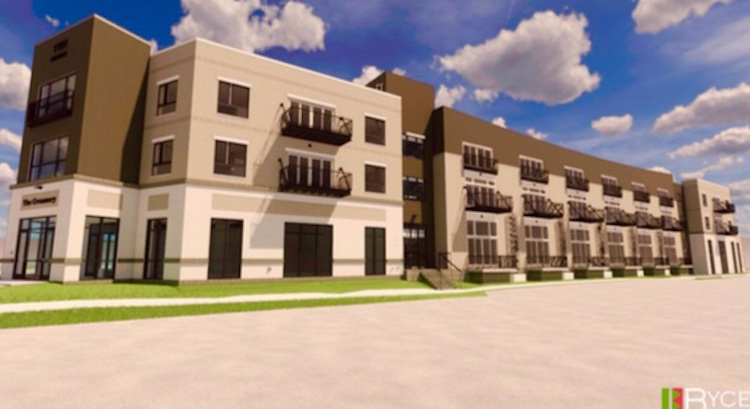
About 1,500 square feet of space will be used as a small business accelerator area. It will lease space at a deeply discounted rate to a qualifying small business that applies. A priority will be given to local businesses, those that can demonstrate a benefit to the neighborhood, and those that will be accessible to most of the people in the neighborhood, he says.
Through the accelerator program, Hollander says, “We’re looking to fill gaps in what is needed in the area.” Among other things, he says, “The neighborhood lacks casual-dining options, things that generate walk-off-the-street options.”
“It definitely will bring more residents to the community,” Tammy Taylor, executive director of the Edison Neighborhood Association, says of The Creamery. “Throughout the whole city of Kalamazoo, there’s a shortage of housing in general, not just affordable housing.”
So, she says, Edison is looking forward to more new housing that will serve low- and middle-income working people. Quality housing that is affordable for a mix of incomes is something area people have wanted for years and Hollander Development is following requests area people made in a series of 2011 public planning sessions.

The Edison Neighborhood is Kalamazoo’s largest and most socio-economically diverse neighborhood. Of some 3,532 housing units, 51 percent are owner-occupied and 49 percent are rental.
“It’s going to bring more people to Washington Square,” Taylor says.
Clarke says, “It’s so encouraging to see the community’s idea — that this formerly blighted space could be the site for a new mixed-use and mixed-income development on Portage Street — on its way to becoming a reality.”
Following the series of meetings in 2011, the Edison Neighborhood Association, the Kalamazoo County Land Bank and others developed a vision that reflected what area residents hoped to see.
“We applaud the Hollander Development group for their willingness to be responsive for the community vision articulated for this site in 2011 by Edison residents,” Clarke says.
She described it as “a wonderful complement to other community-driven efforts” that have been underway in the area for the last 10 years, including the development of Marketplace residential area just west of Washington Square and the attraction of businesses such as Jersey Giants Subs, Community Promise Credit Union and the Pho On The Block restaurant in Washington Square.
Of The Creamery, Clarke says, “I hope that when the doors open that we will have replaced what was an eyesore on Portage and Lake streets, which was a dangerous and blighted and vacant building, with something that is attractive and something that speaks to what the residents had articulated they would like to see.”
More to know
• The PILOT agreement between the city of Kalamazoo and the Kalamazoo Creamery Limited Dividend Housing Association Limited Partnership helps support The Creamery project along with a HOME Investment Partnership Program grant through the city of Kalamazoo. The latter helps fund such things as building, rehabilitating and/or buying affordable housing.
• A Low Income Housing Tax Credit is a major element of the financing package, Hollander says. And the project hopes to attract financial support from the Michigan Economic Development Corp.
• The Michigan State Housing Development Authority is the primary lender for the project. InSite capital, which is a subsidiary of Chemical Bank, is the primary private investor. The Kalamazoo Brownfield Redevelopment Authority is supporting the project with tax increment financing. And local foundations and others are working with MSHDA to invest in the project.
• Kalamazoo-based Byce & Associates architectural and engineering firm helped craft the vision for the project and continues as architect. Frederick Construction, of Vicksburg, will be the construction manager. KMG Prestige, of Mt. Pleasant, will manage the property.
• The Creamery will be LEED Platinum certified. It will have solar panels, green roof elements, and highly efficient insulation, HVAC and plumbing systems. All of the materials used will be nontoxic and will have a high level of indoor environmental quality. Hollanders says, “Our company specializes in energy-efficient design.” The company lays claim to developing 4,000 units of affordable housing since 1979. “The reason that we do it — besides all of the environmental benefits — is we’re in the business of development of affordable housing. … The more efficient we can make a unit, the more it benefits everyone involved in the project.”
• Those interested in more information may send an email to creamery@hollanderdevelopment.com or contact Hollander developer Corp. at 269-388-4677.


